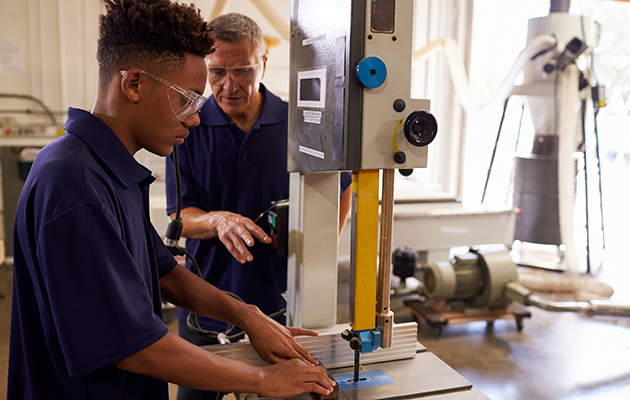Supporting Children on the Journey from ABCs to SATs
Rigorous research and evaluation are crucial to understanding what works in education and improving student outcomes. However, it is just as important to include communities in the research process and see that evidence arrives in the hands of those who work with children every day.
Mathematica and its partners in education continue to do both as they investigate and promote methods and practices that improve children's chances for success in the workforce. Gathering evidence and putting research into practice at every grade level help improve these chances.
Building Strong Foundations for Early Childhood Learning

Principal Dr. Robin Moore: The Go-Learn-Grow Toolkit
Preventing chronic absenteeism
Chronic absenteeism is particularly high for students in preschool and kindergarten. Because students need to establish a foundation for learning at this age, chronic absenteeism can have unexpected long-term impacts, such as grade repetition and dropping out of school down the road. As the leader of the Regional Educational Laboratory (REL) Mid-Atlantic, Mathematica worked to research evidence-based approaches to addressing chronic absenteeism. Together, we worked with the New Jersey Department of Education to create a toolkit for districts, schools, early childhood providers, and parents. It contains simple, easy-to-use resources and handouts in English and Spanish to help schools improve attendance in the early years.

“Conducting truly rigorous and objective research means ensuring the communities we seek to learn from have the primary voice in the research.” -Joe Baker, researcher, Mathematica
Designing inclusive, culturally relevant studies
Until recently, data on early childhood learning in American Indian and Alaska Native (AI/AN) communities was scarce. This is in part because traditional approaches to evidence gathering didn't resonate culturally with the communities, making it difficult to amass the data needed to understand trends.
Mathematica collaborated with AI/AN stakeholders and the Office of Planning, Research, and Evaluation, an office of the U.S. Department of Health and Human Services' Administration for Children and Families (ACF), to design a culturally relevant study — the American Indian and Alaska Native Head Start Family and Child Experiences Survey (AI/AN FACES). Staff working on the study underwent cultural humility training before working with communities.
Guided by the principles of community-based participatory research, the study addressed an information gap as the first national study of children and families participating in Head Start programs operated by federally recognized tribes. Following the study, Mathematica, the Tribal Childhood Research Center, and ACF produced briefs and hosted webinars with the Native communities to ensure the findings were distributed and used.
Equipping Elementary Students for Success
Honing writing and math skills at home
REL Mid-Atlantic at Mathematica developed a short guide based on the What Works Clearinghouse (WWC) practice guide to help parents improve their children's writing skills at home through activities like writing stories, reviewing movies, and describing things around them.
The Mathematica team leading the WWC also developed remote math instruction guides for the Institute of Education Sciences (IES) at the U.S. Department of Education to help educators as they provide remote instruction during the COVID-19 pandemic. Similarly, in partnership with IES, we developed two math tip sheets for parents and caregivers to support children’s learning at home. These tip sheets provide easy-to-implement activities to support understanding of fractions at the elementary and middle school grades and algebra at the middle and high school grades.
We help disseminate guides like these through social media and by sending them out to nonprofits that work with parents and children, such as the National PTA, Families and Schools Together, Unidos US, and Parents as Teachers.
Optimizing school choice websites for parents
The Every Student Succeeds Act requires states and districts to provide public report cards that include information on state, district, and school performance and progress in an “understandable” and “user-friendly” manner. To help optimize these websites for parents, Mathematica examined school shopping websites in 12 U.S. cities. We also surveyed parents, using different types of information displays, to understand how they make choices about which schools their children attend.
With the results of the study, Mathematica developed a guide for states, districts, and educational organizations to assist them as they design their websites to display school choice information for parents. The guide examines formatting, data sources, default sorting, district averages, and more, and it explains how design can influence school choice.
Read the school choice information guide for parents.

Tips for Writing and Math at Home
Improving Middle School Education Across Demographics
Missouri middle school shrinks college enrollment gap
Mathematica is eight years into a nine-year study of the Kauffman School, a tuition-free charter school in Kansas City, Missouri, that serves 89 percent Black and Hispanic students. Our analysis showed that the school has had a positive and statistically significant impact on enrollment in four-year colleges, with Kauffman students 16 percentage points more likely to enroll in a four-year college than if they had attended another local public or charter school. The school is also having sustained positive impacts on student achievement growth in mathematics, English language arts, and science. The Kauffman School's impact is large enough to close the gap in four-year college enrollment rates for Black high school seniors in Missouri.
Read more about the Kauffman Charter School evaluation.
Improving middle years math for underserved students
We are working for the Bill & Melinda Gates Foundation to improve middle years math instruction so that students who are Black, Latino, or experiencing poverty deeply know, use, and enjoy math by the time they reach high school. Our experts developed an evidence-building framework to identify, refine, and test promising approaches and tools for students and educators. Through partnerships with local school districts, community leaders, teachers, parents, and others, we supported developers to pilot test these approaches and tools, make evidence-informed improvements to their design, and measure their impact to advance equity for underserved students.
Learn more about this program.
Preparing High Schoolers for the Workforce
Partnering with businesses for career success
Providing high-school students with the soft skills they need for postsecondary education and their future jobs can increase their chances of success. REL Mid-Atlantic at Mathematica worked to bring together educators, local businesses, civic organizations, and community colleges in Pennsylvania to assess the skills in demand in the state's changing workforce. Together with our partners, we hosted a workshop to assess essential skills for career readiness in the region, analyze what teams are currently teaching across school districts, find common problems, and create resources for assessing soft skills and preparing students for future success.

REL Mid-Atlantic Career Readiness Alliance
Getting Across the Finish Line
The Working Students Success Network supports community colleges across the United States to help low-income students and students of color reach financial stability and move up the economic ladder through integrated financial and support services. We studied the program, which serves about 50,000 students through an equity framework. To achieve equity, colleges are addressing the root causes of challenges facing students who experience poverty and discrimination: lack of access to financial aid, housing, food, and technology, and lack of personal safety.
To understand this further, we conducted case studies focused on two community colleges in Washington State. We spoke to students, faculty, and staff members to gauge their understanding of and interaction with the program’s services. The research team concluded that different student populations need different supports to achieve the same level of success. To achieve equity, schools should abandon a one-size-fits-all approach, actively seek and listen to student voices, and provide culturally responsive support.
Explore the findings from case studies of colleges in the Working Students Success Network.
To learn more about our work, or to see how we can help you improve teaching and learning in your area, get in touch with one of our education experts by sending an email to info@mathematica-mpr.com
